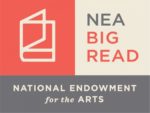Big Read Program: Harper Lee Out,
Emily St. John Mandel In
 The NEA announces today a new focus for the Big Read program, the national version of the Nancy Pearl invention “If All Seattle Read the Same Book.” The new focus, “Reflects Diversity of Contemporary Lives and Authors.”
The NEA announces today a new focus for the Big Read program, the national version of the Nancy Pearl invention “If All Seattle Read the Same Book.” The new focus, “Reflects Diversity of Contemporary Lives and Authors.”
As a result, several titles have been dropped, reports a syndicated story by the AP, including a staple of One Book programs, Harper Lee’s To Kill a Mockingbird, as well as poetry by Emily Dickinson, Ray Bradbury’s Fahrenheit 451, F. Scott Fitzgerald’s The Great Gatsby, and John Steinbeck’s The Grapes of Wrath.
13 titles have been added. Among the new entries are more works by women, works in translation, poetry, short stories, memoirs, as well as genre titles. Updated selections for three authors already on the list, Louise Erdrich, Marilynne Robinson, and Tobias Wolff, are also included..
The new titles are:
Five Skies, Ron Carlson (PRH/Penguin)
The Round House, Louise Erdrich (Harper/Harper Perennial)
How We Became Human: New and Selected Poems 1975-2002, Joy Harjo (Norton)
To Live, Hua Yu, translated by Michael Berry (PRH/Anchor)
Pretty Monsters, Kelly Link (PRH/Speak)
Station Eleven, Emily St. John Mandel (PRH/Knopf)
Everything I Never Told You, Celeste Ng (PRH/Penguin)
Citizen: An American Lyric, Claudia Rankine (Macmillan/Graywolf Press)
Gilead, Marilynne Robinson (Macmillan/Picador)
This Boy’s Life: A Memoir, Tobias Wolff (Perseus/PGW/Legato/Grove Press)
The Latehomecomer: A Hmong Family Memoir, Kao Kalia Yang (Consortium/Coffee House)
Book of Hours, Kevin Young (PRH/Knopf)
Ways of Going Home, Alejandro Zambra, translated by Megan McDowell (Macmillan/FSG)
The full list of Big Read titles is available online.
The books were selected by a range of readers, including a librarian, following a criteria that stressed the “capacity to: inspire lively and deep discussion; expand the voices, stories, and genres represented; generate interest from lapsed and/or reluctant readers while also challenging avid readers; and encourage innovative programming for communities.”
In the NEA’s statement, Amy Stolls, director of literature, says: “We hope that this new direction will inspire folks to discover new books and enjoy talking about them with family and friends, neighbors and peers, and especially people they have yet to meet.”
